We Dive Into Your Projects
What were the projects or initiatives you worked on? We probe to understand the scope, the stakes, and the significance.
"Tell me about the biggest project you led last year..."20+ Human Resources Resume Examples
In Human Resources, you're competing with 1,160 applicants per search
You're Not Rejected.
— You're Overlooked —
We fix your human resources resume with one conversation
The strongest human resources resumes lead with recruitment outcomes, retention impact, and program results — not HR function lists or HRIS platform names. Hiring managers at organizations like Google, Amazon, and Salesforce scan for time-to-hire metrics, turnover reduction, engagement score improvements, cost savings, and proof that your HR work drove measurable business outcomes. Every resume sample on this page was built through a 1-on-1 interview that extracted the specific talent and organizational outcomes that differentiate candidates in a field averaging 1,160 competitors per job search.
Each human resources resume sample below was written through our 1-on-1 interview process. Click any human resources resume example to see the full sample and learn how we transformed their experience into proof.
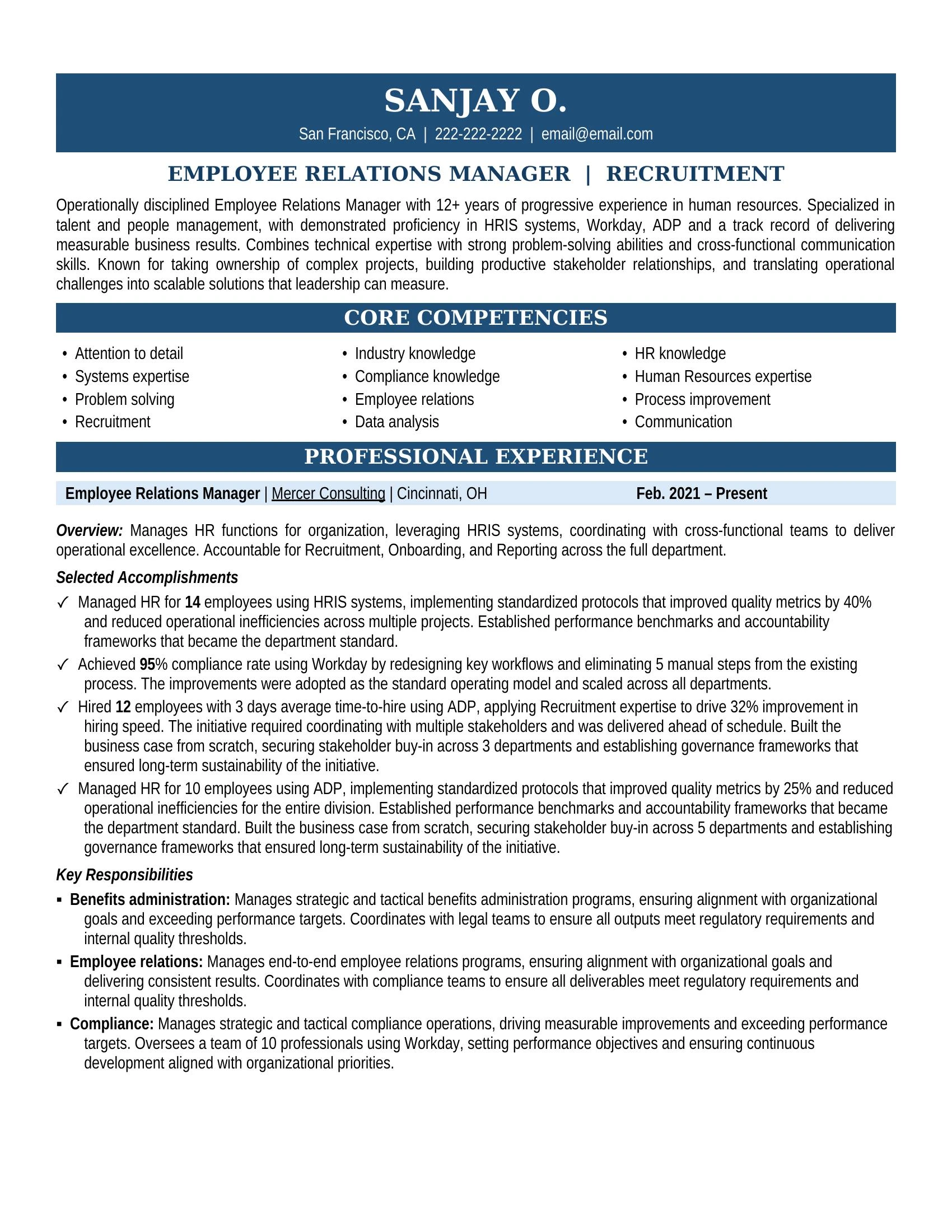
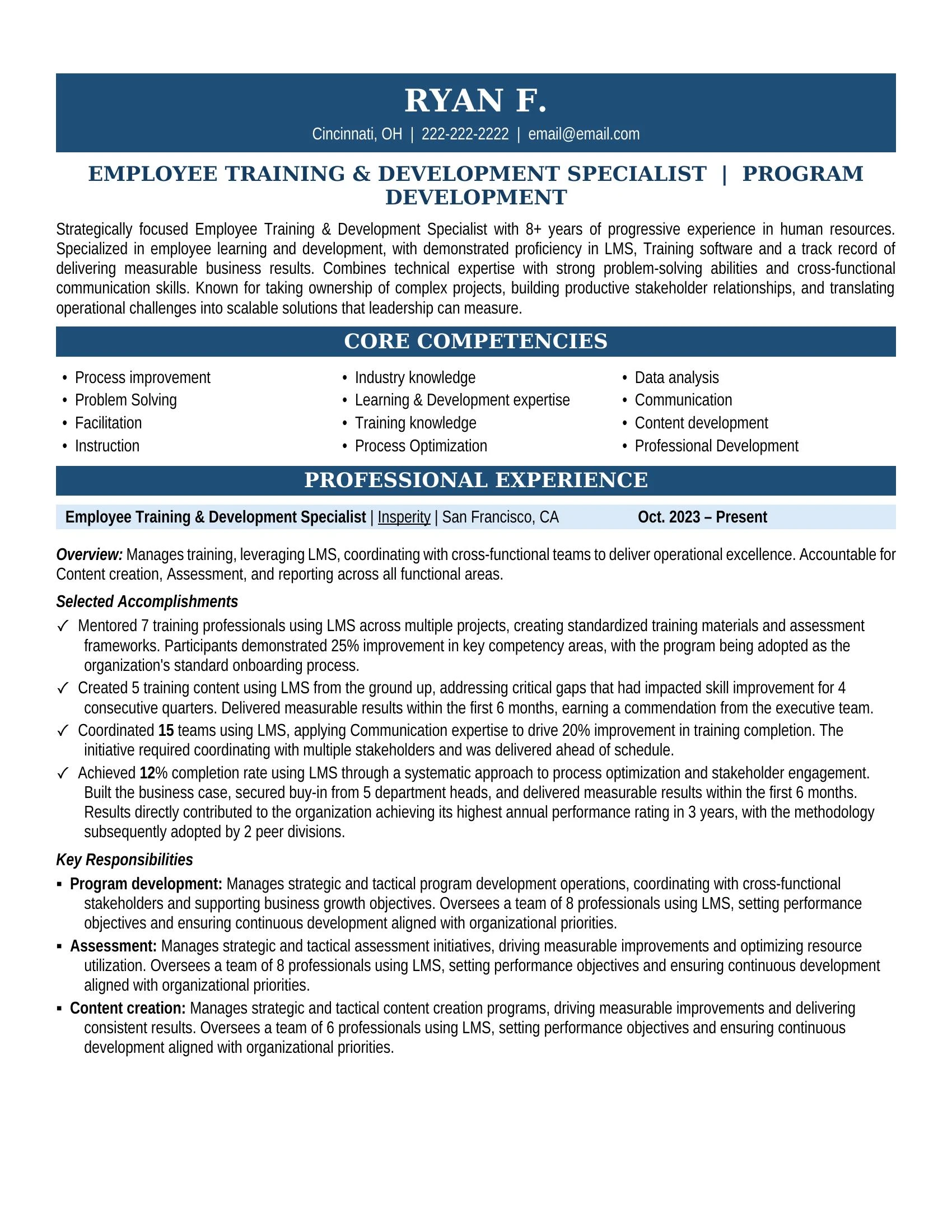
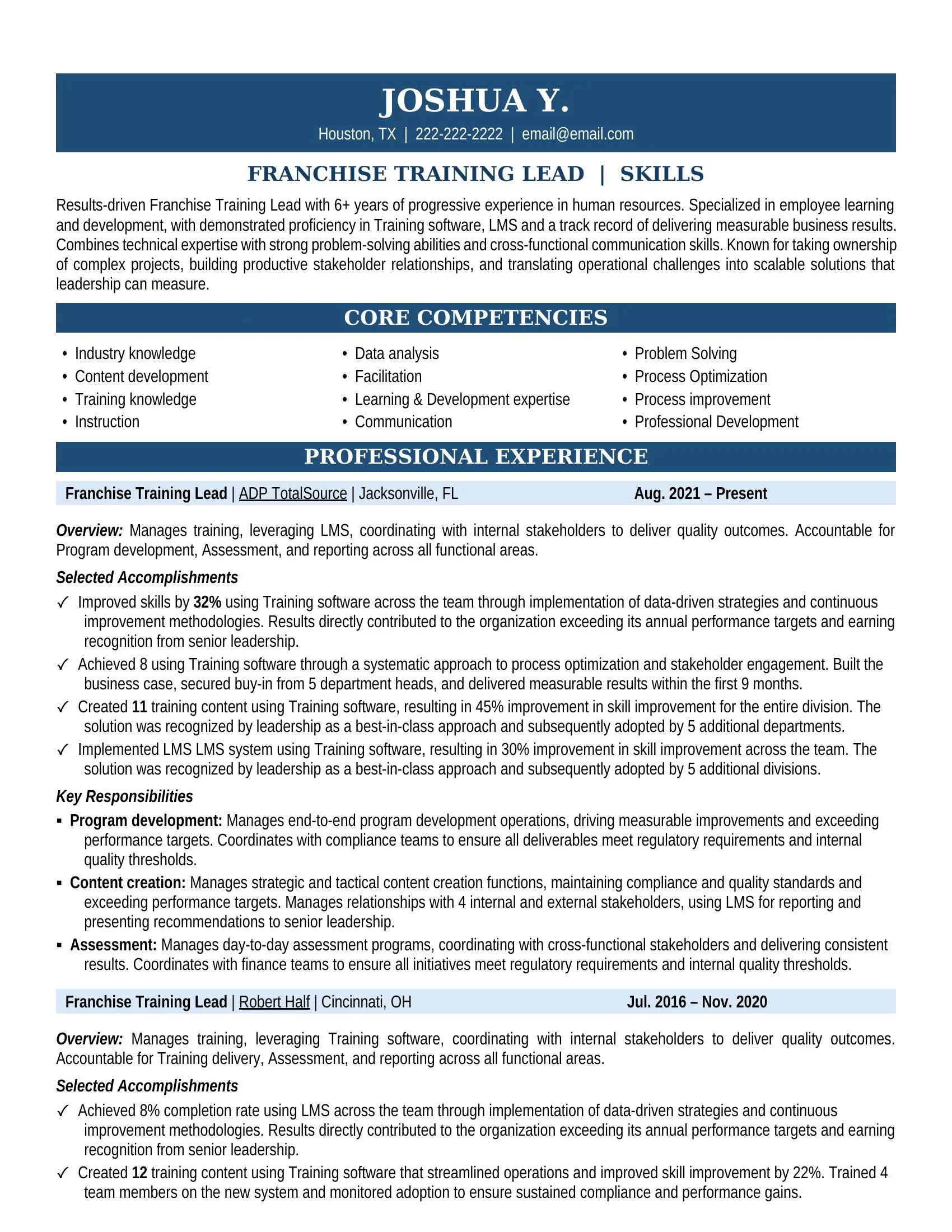
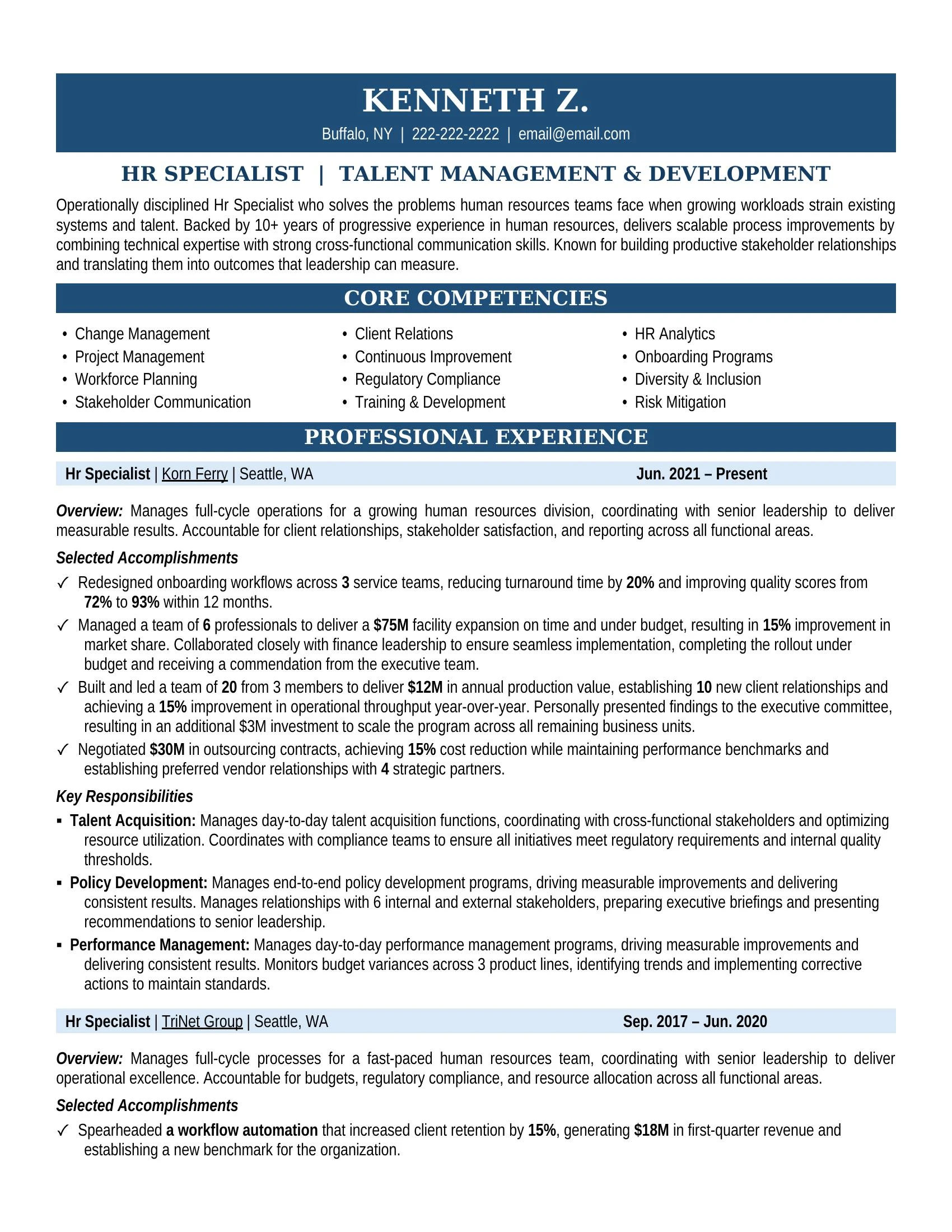
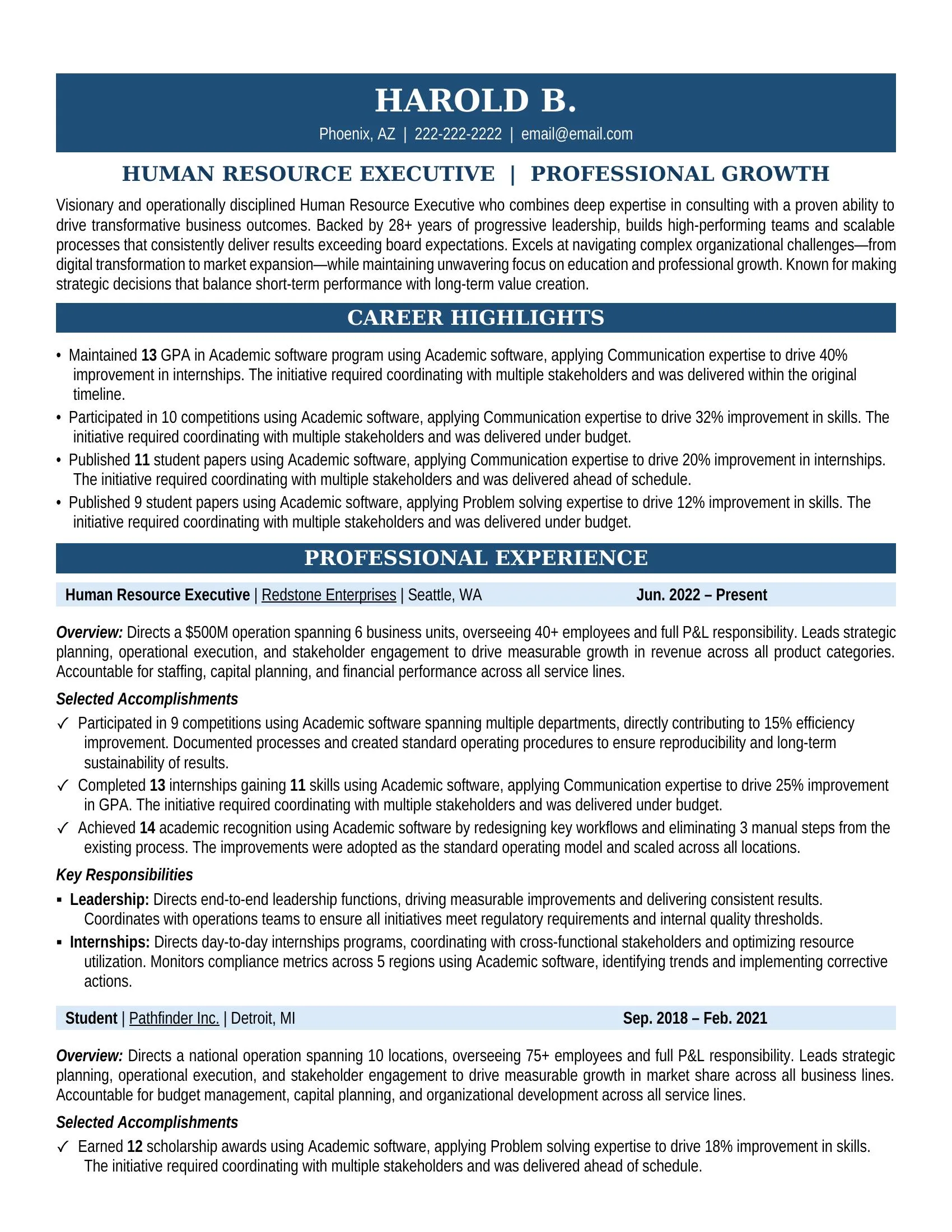
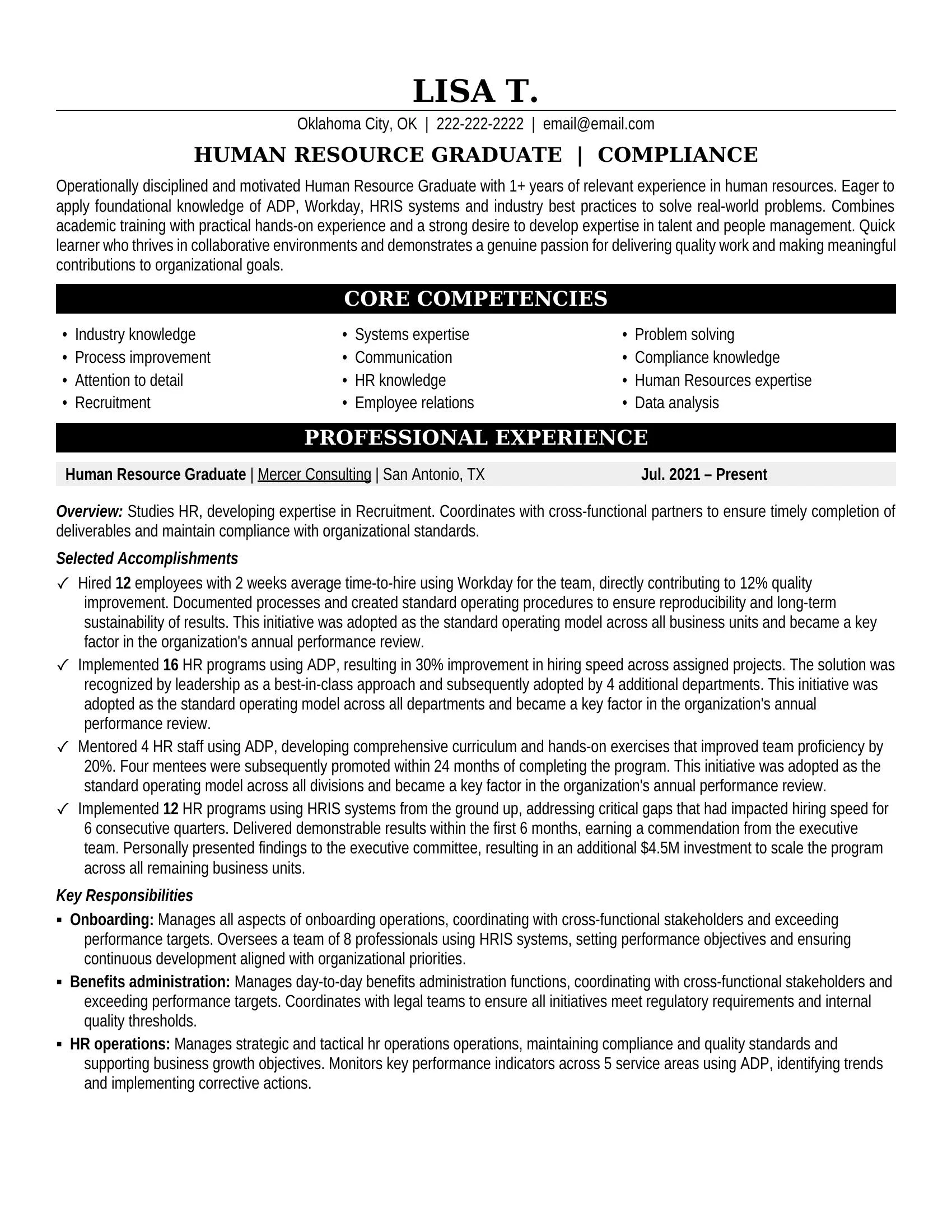
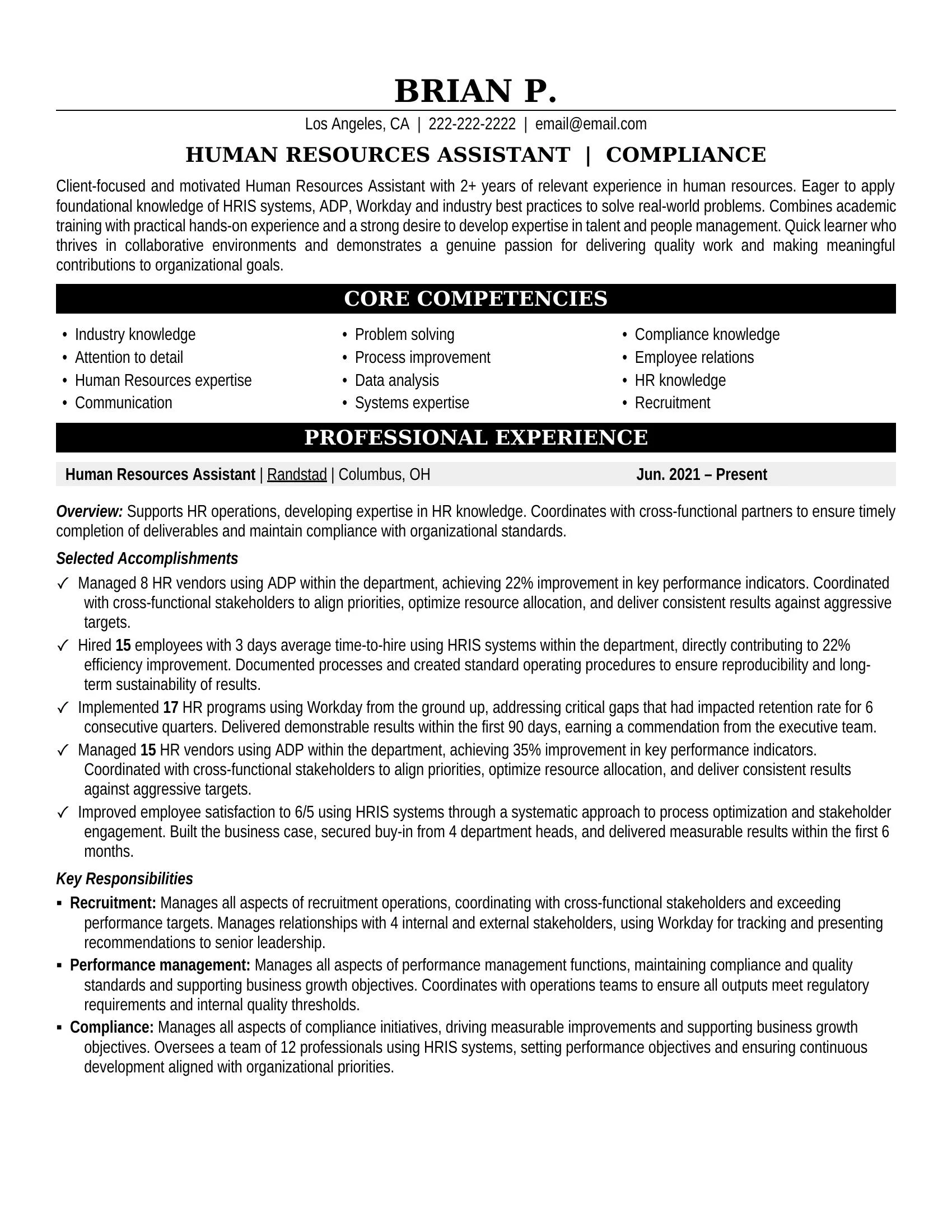
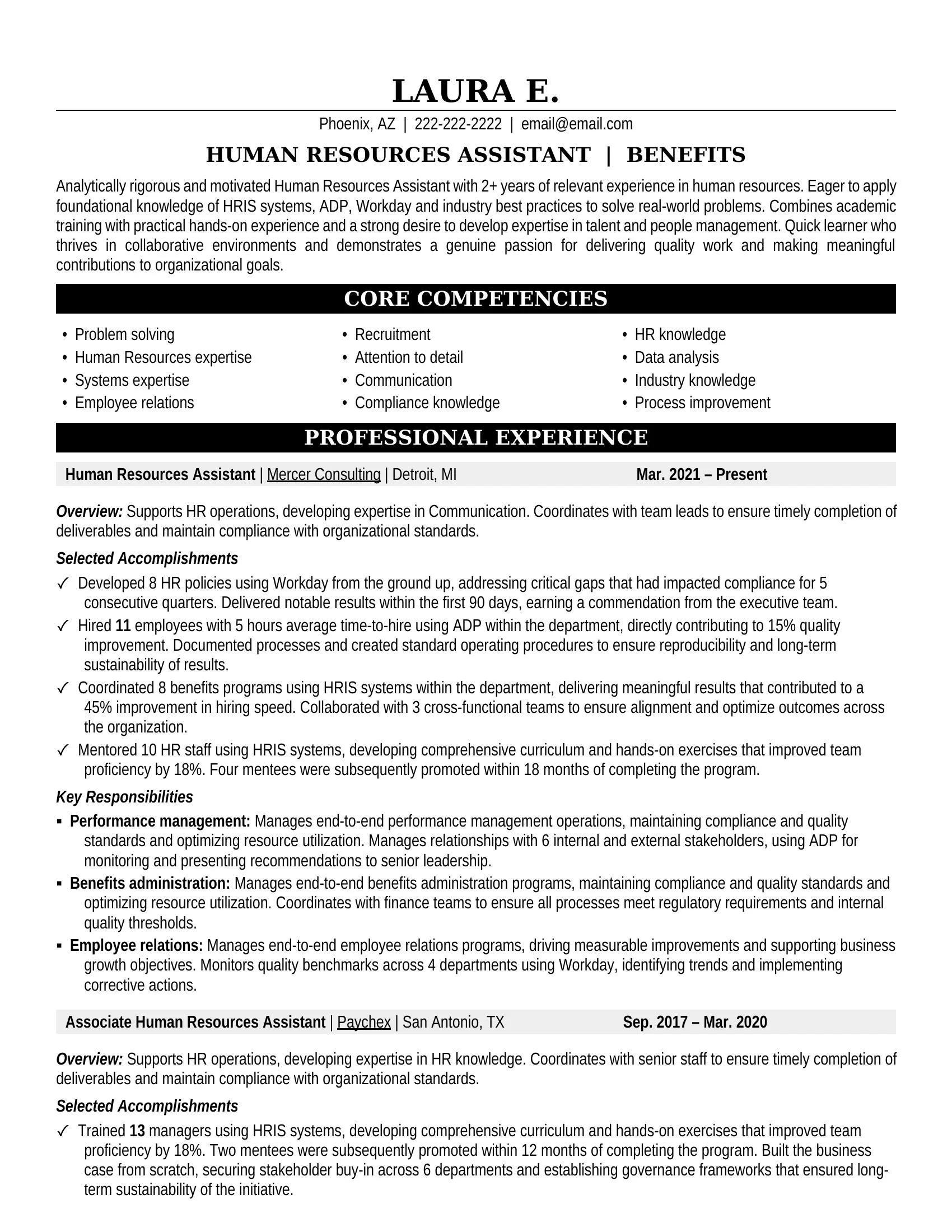
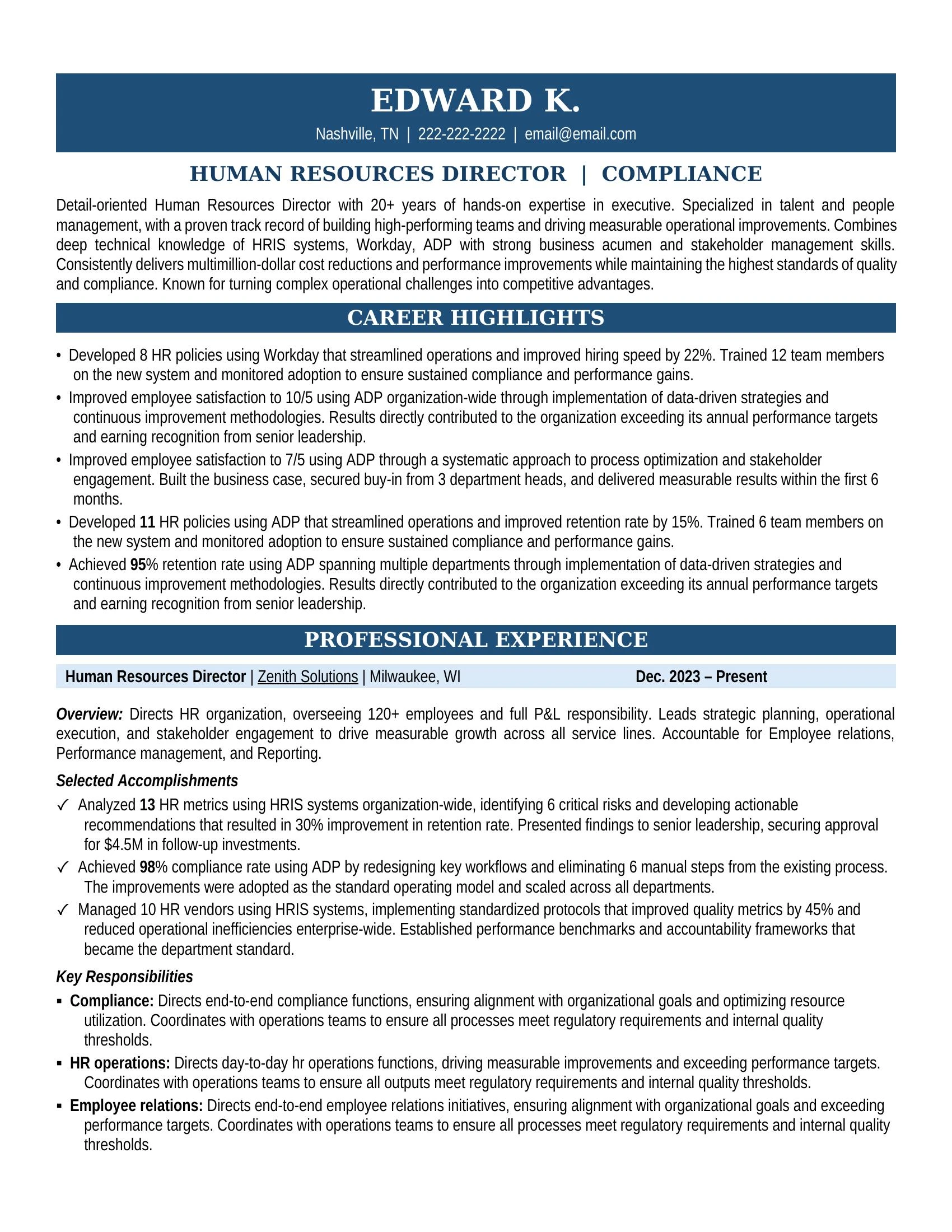
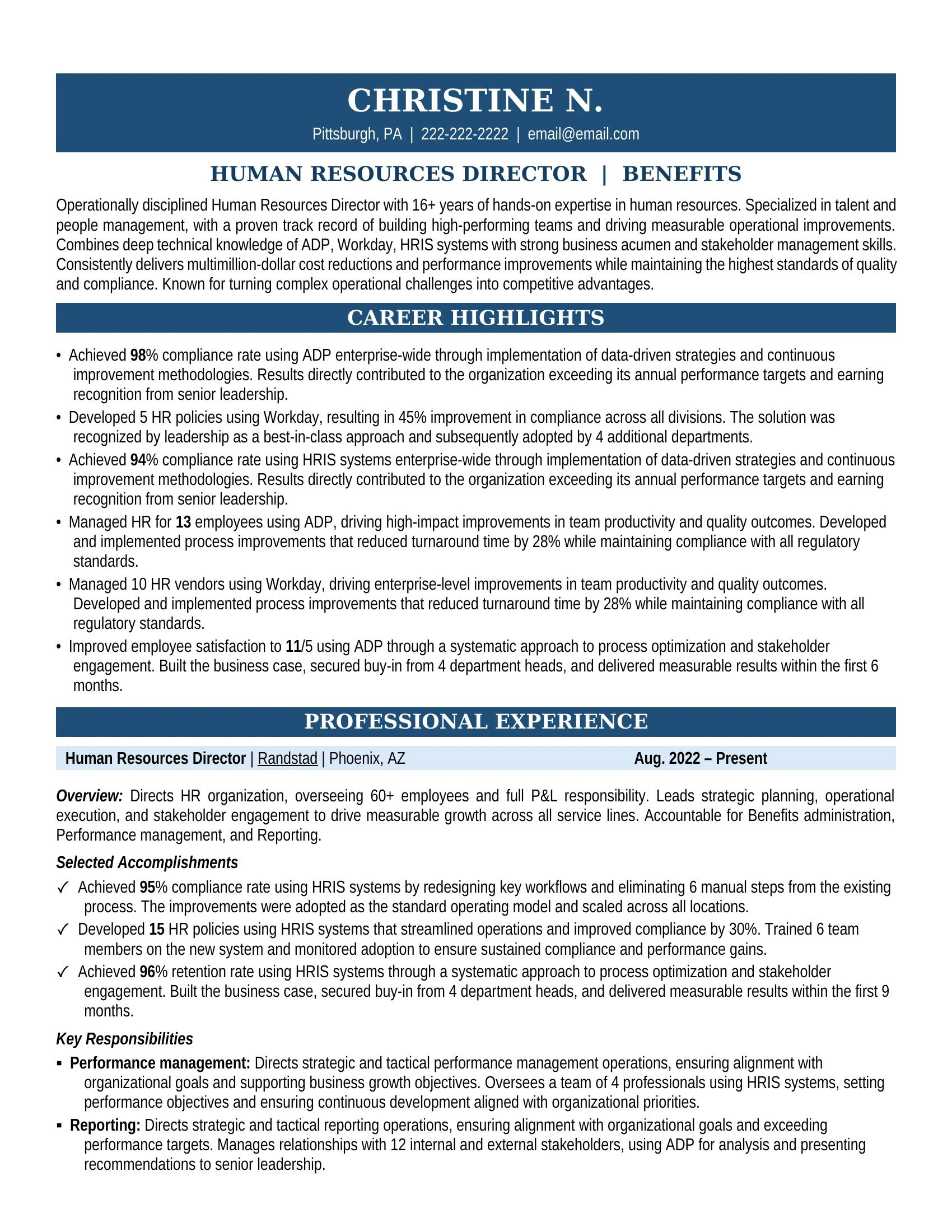
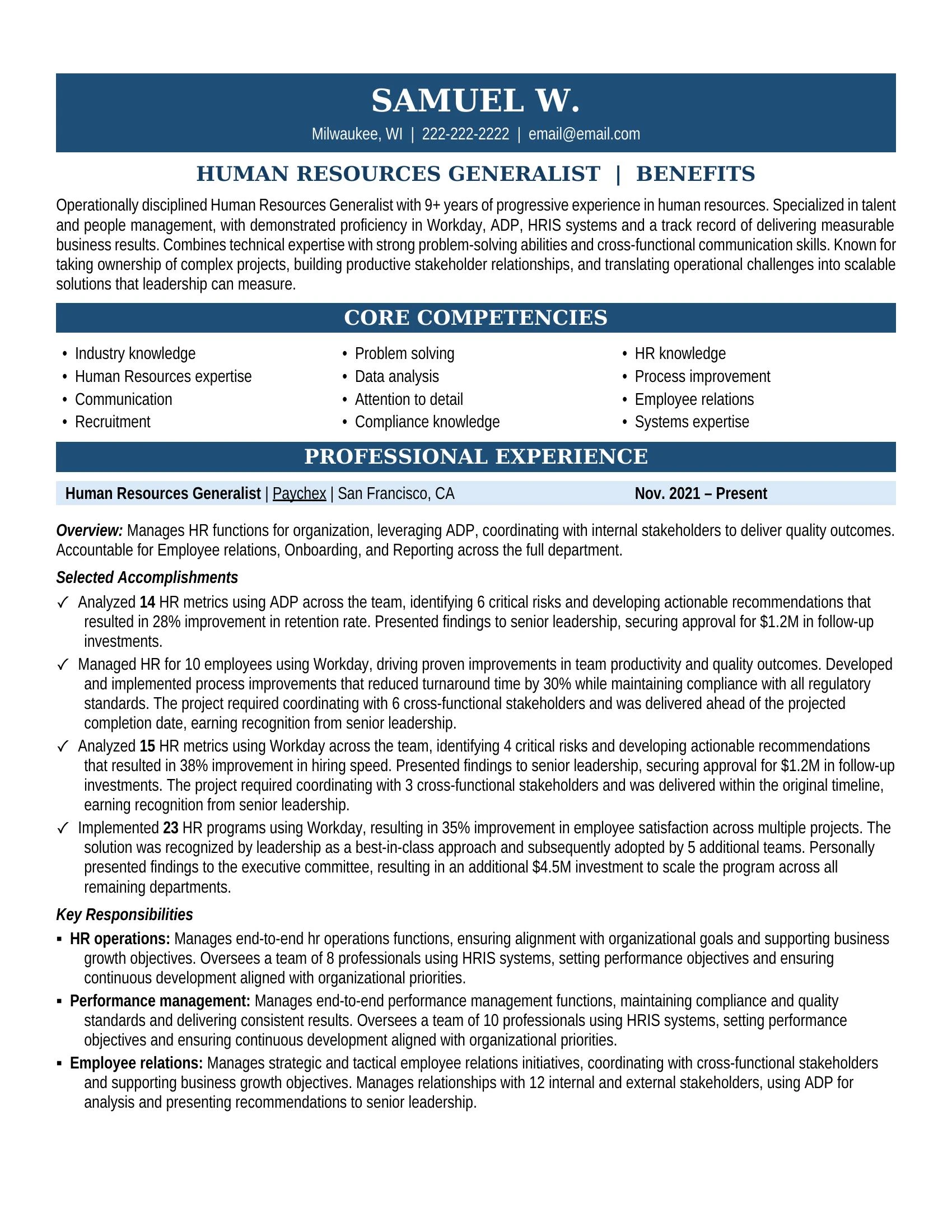
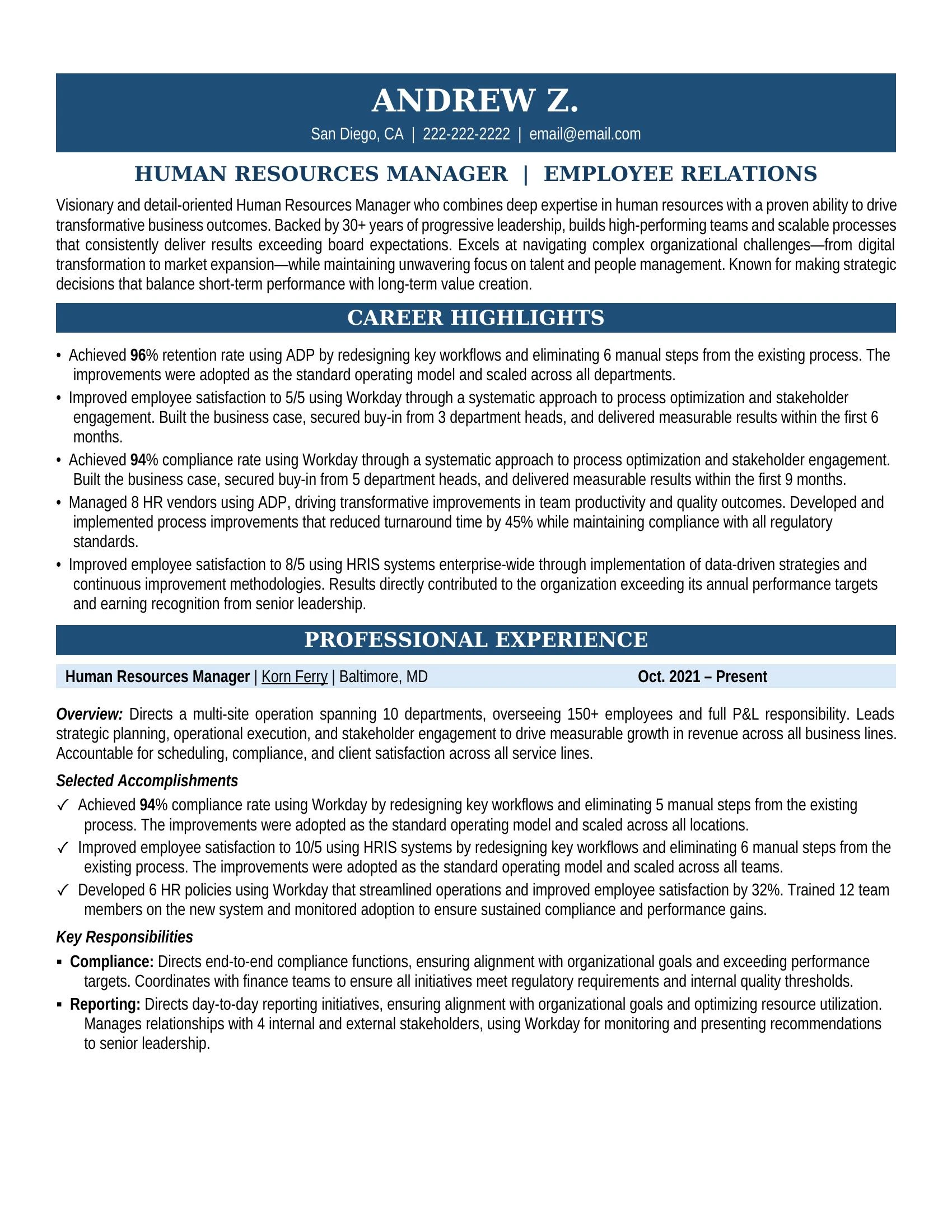
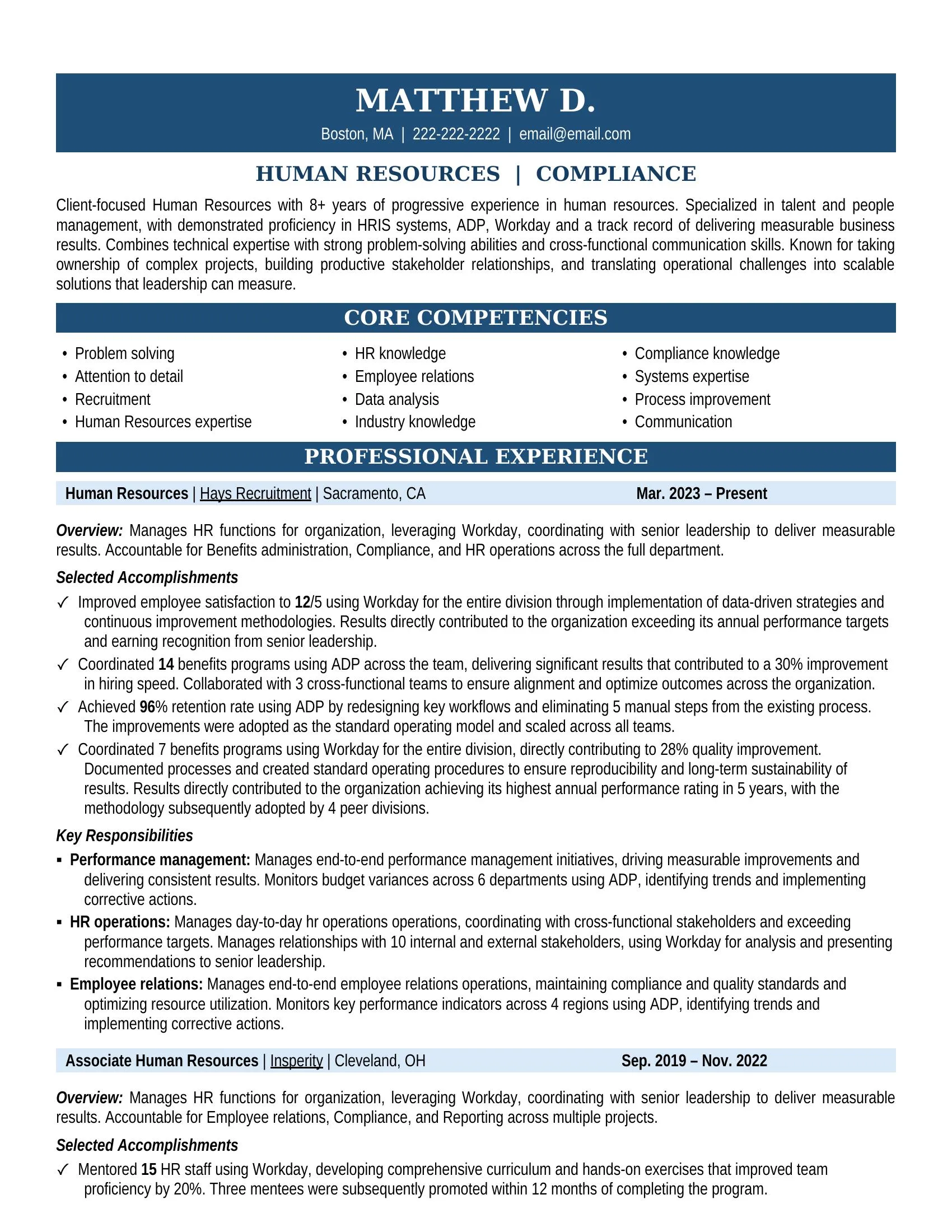
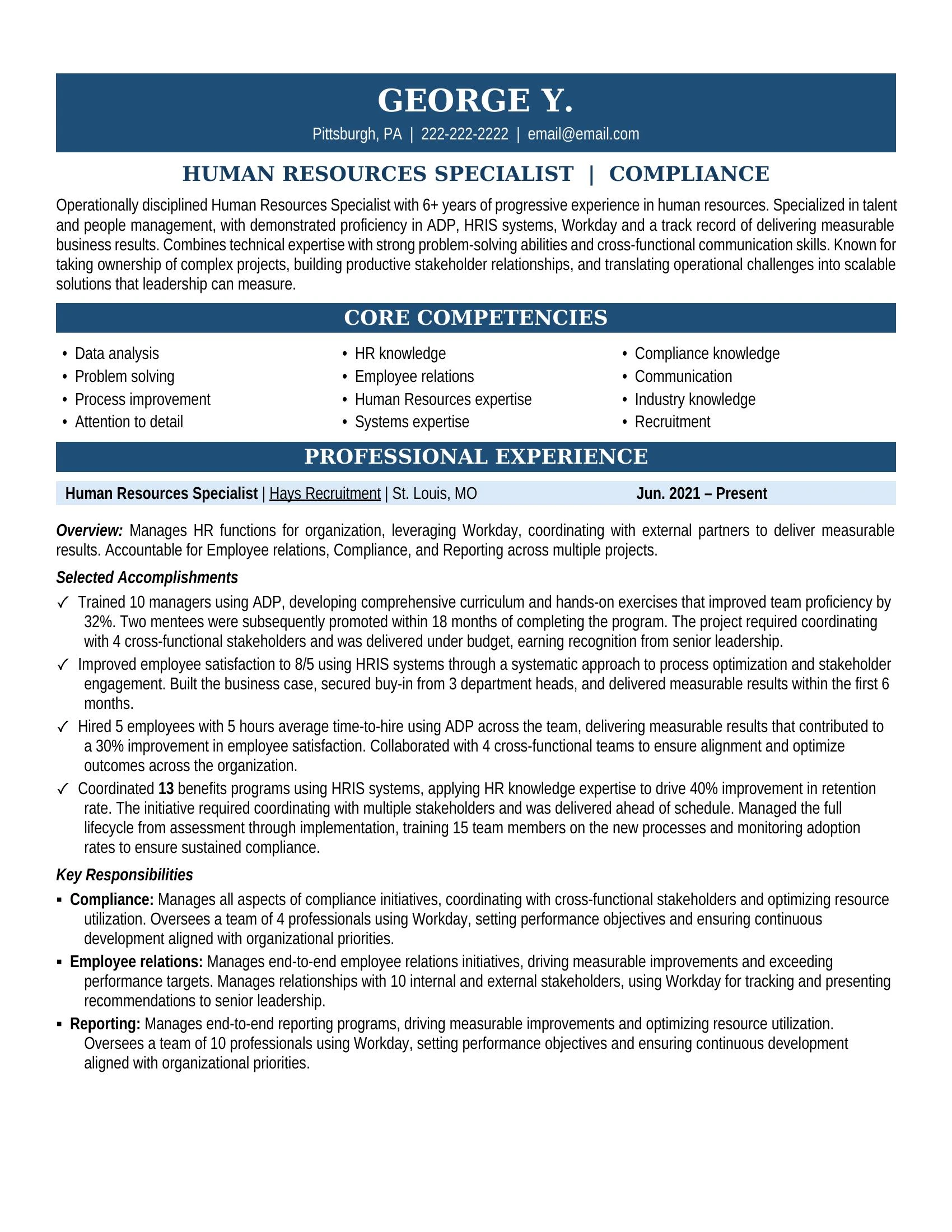
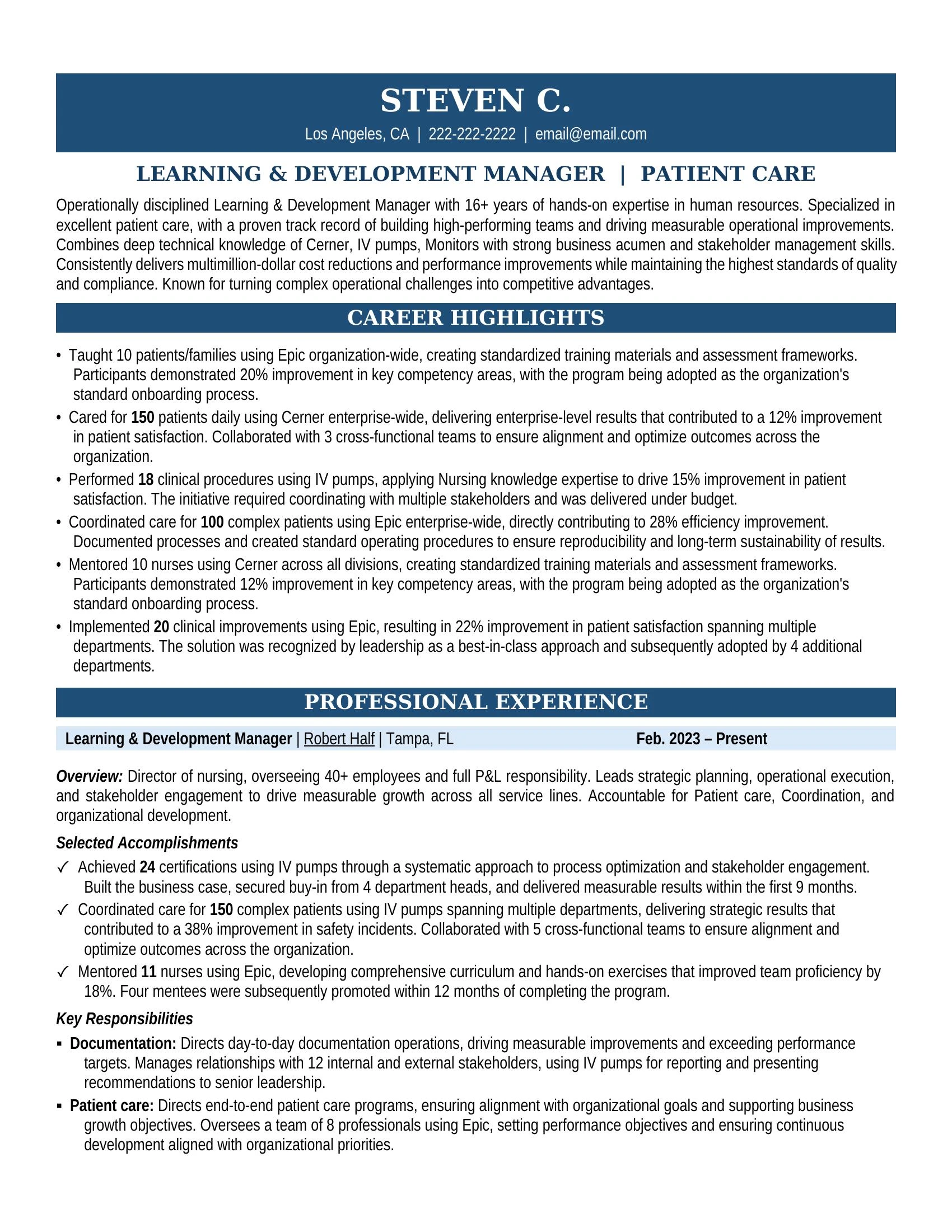
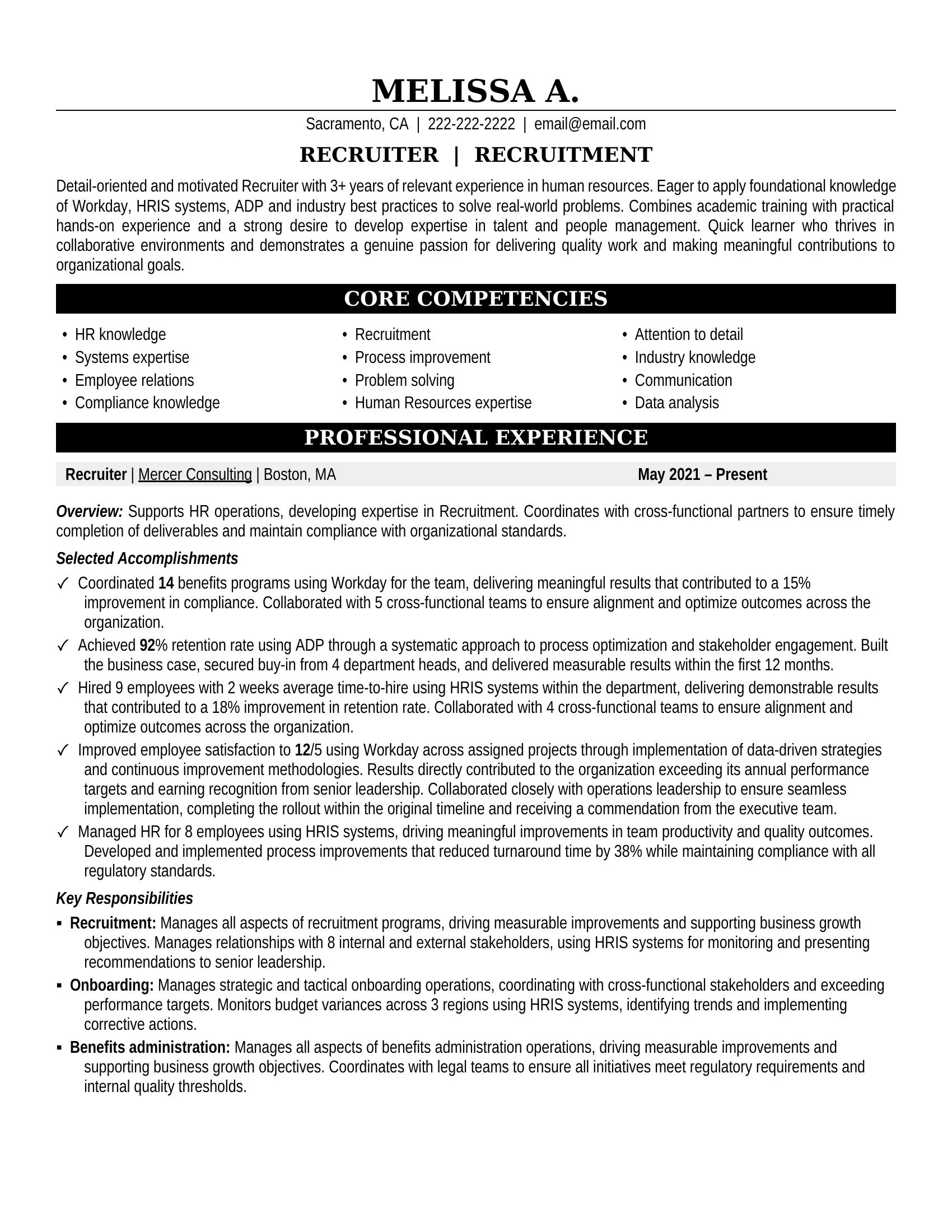
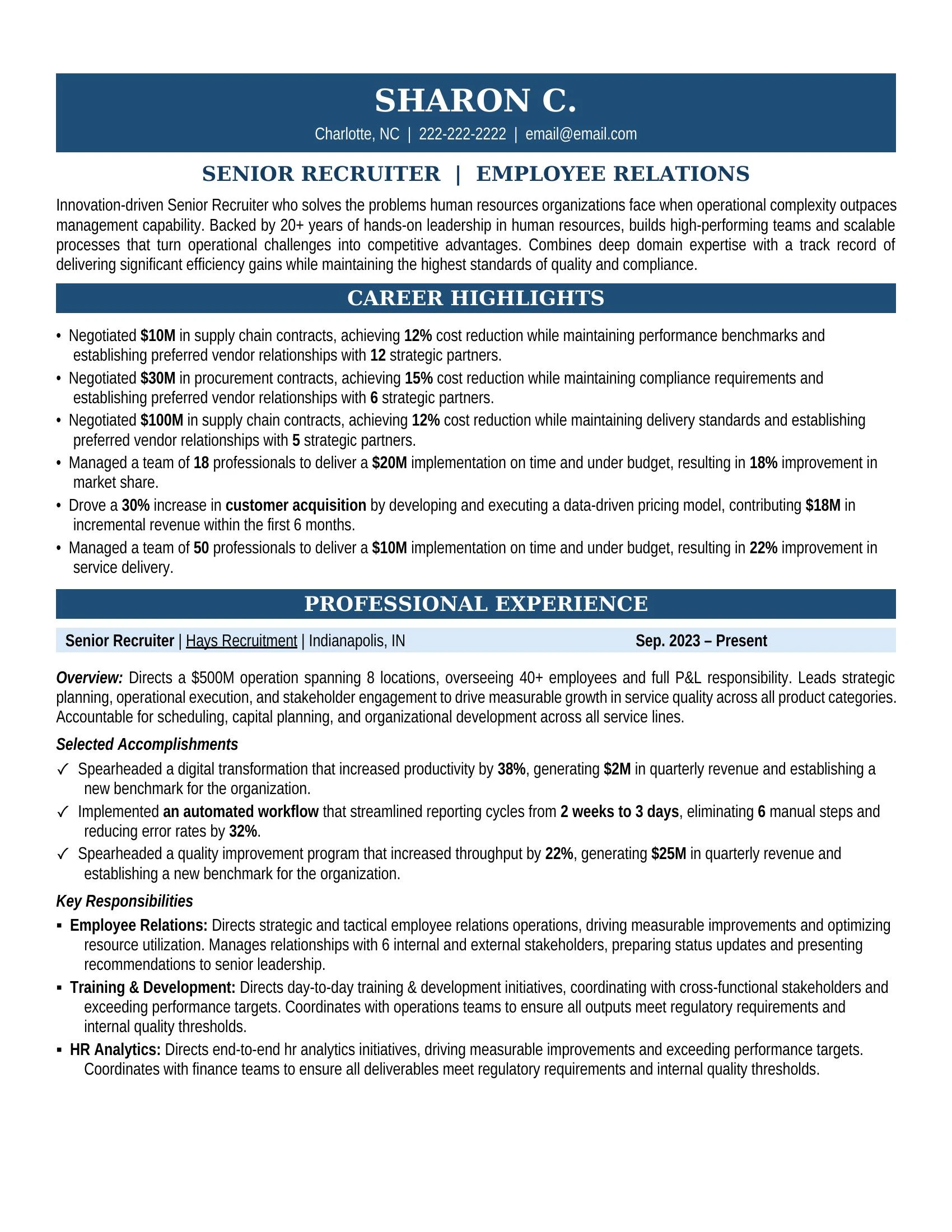
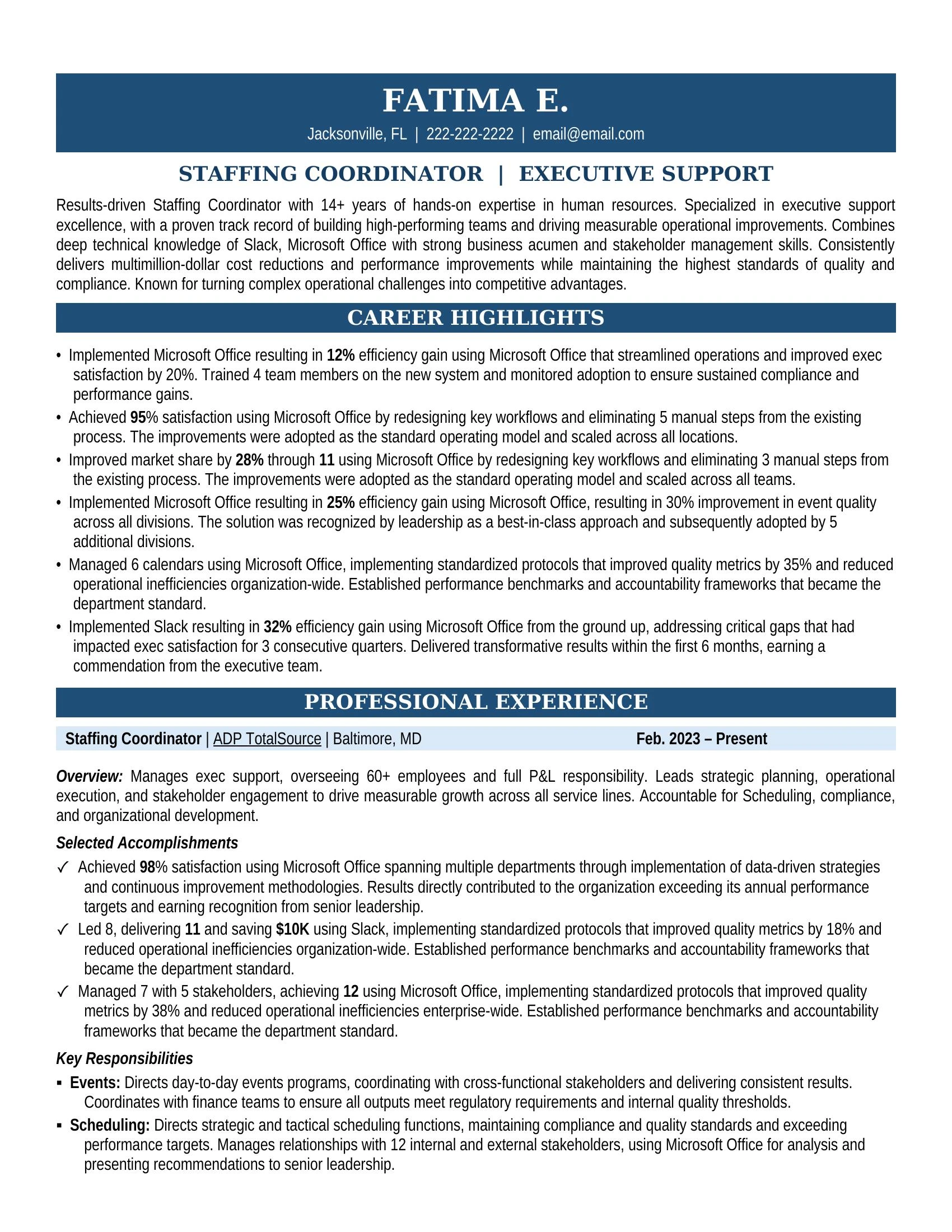
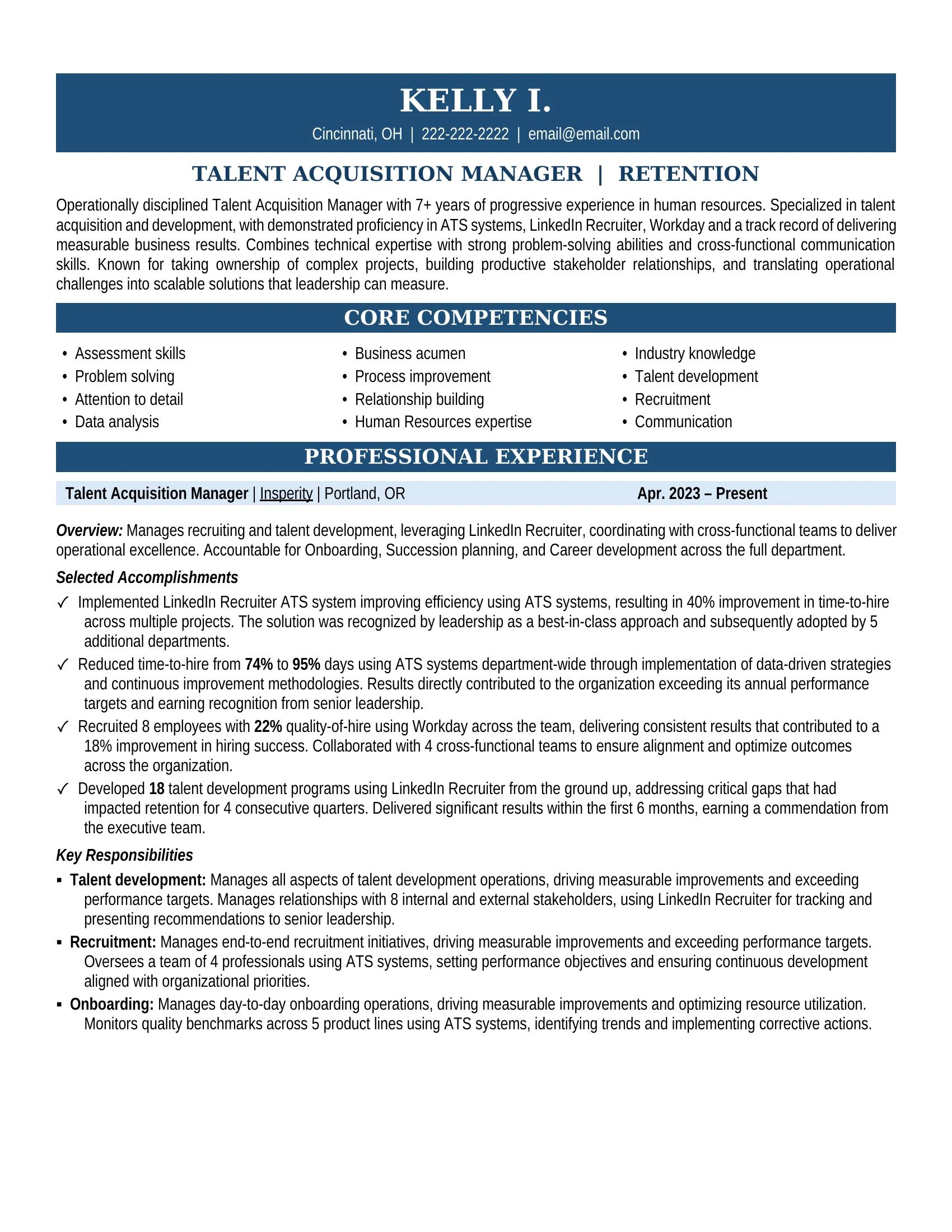
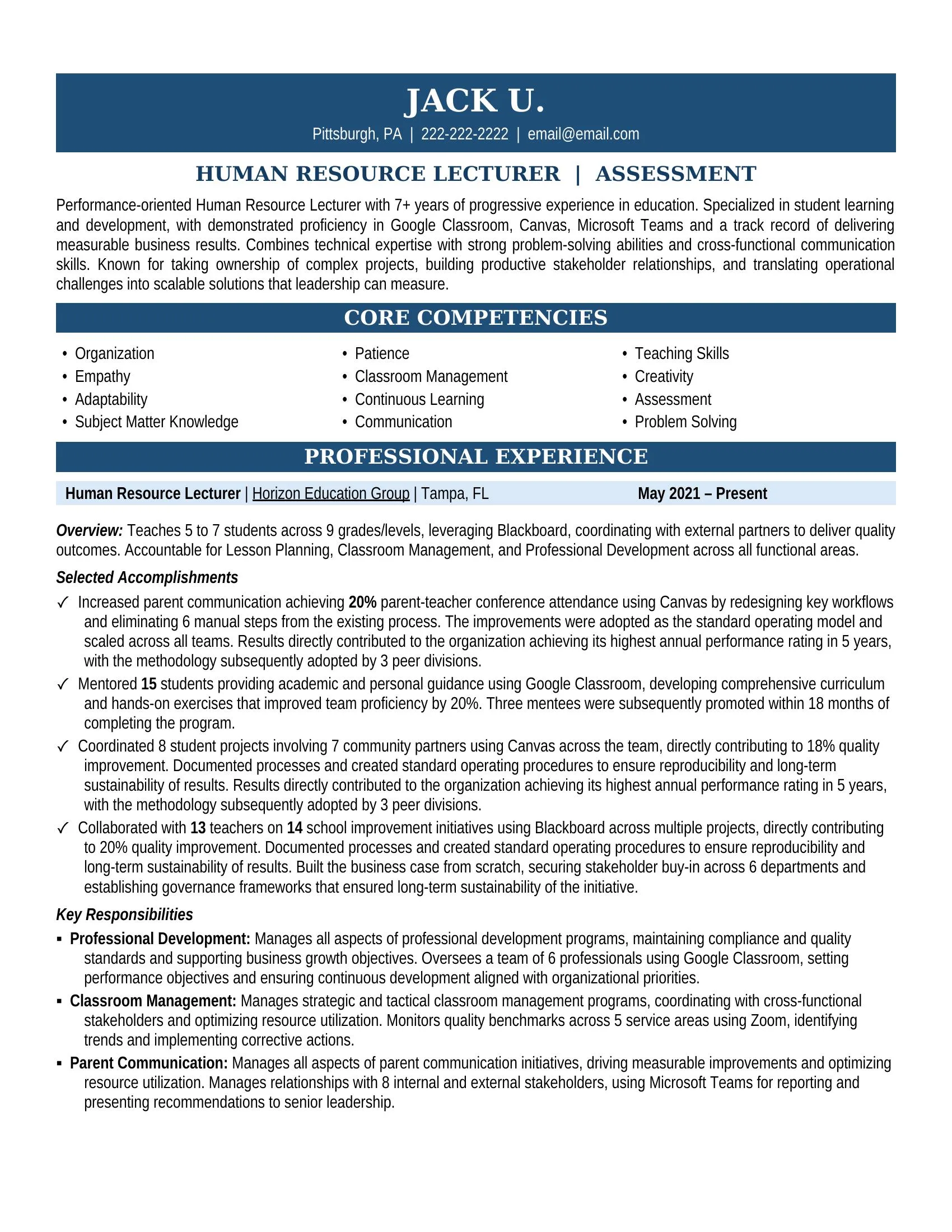
When a hiring manager reads your human resources resume, they should think:
"This person has solved the exact problems we're facing."
What were the projects or initiatives you worked on? We probe to understand the scope, the stakes, and the significance.
"Tell me about the biggest project you led last year..."What were the goals of the project? The company's objectives? We connect your work to business outcomes.
"What was the company trying to achieve with this?"What systems, processes, and strategies did you implement? This is where your expertise becomes visible.
"Walk me through how you actually made this happen..."What challenges did you face? What systems did you implement to overcome obstacles?
"What was the biggest challenge, and how did you solve it?"See how our interview process uncovered achievements and turned them into interview-winning proof.
Get Your Human Resources Resume Written
Human Resources jobs average 58 applicants per position. You're competing against 1,160 candidates. Our human resources resume examples show how to stand out.
Data based on LinkedIn job postings. Updated Mar 3, 2026.
Here's the math most job seekers don't do:
Your human resources resume must stand out against 1,160 professionals.
What makes you different is the story behind the projects.
Get Your Human Resources Resume WrittenHuman Resources Professionals Using Our Resume Templates Work At
Every human resources resume example on this page was written through our 1-on-1 interview process. We extract achievements you'd never think to include.
We identify keywords and achievements that get human resources resumes noticed.
Targeted questions about your human resources projects and results.
Transform responsibilities into quantified achievements.
ATS-optimized resume in 3 business days + 14-day revisions.
80% of human resources positions are never advertised. Get your resume directly into the hands of recruiters filling confidential searches.
When you purchase our Resume Distribution service, your resume goes to 300+ recruiters specializing in human resources — included in Advanced & Ultimate packages.
| Agency | Location |
|---|---|
|
HA
Hays Specialist Recruitment
|
Nationwide |
|
RA
Randstad Staffing Agency
|
Nationwide |
|
KE
Kelly Services Workforce Solutions
|
Nationwide |
|
MA
ManpowerGroup Talent Solutions
|
Nationwide |
|
AD
Adecco HR Services
|
Nationwide |
Human resources averages 58 applicants per position across 14,000 active job postings — one of the most competitive fields because HR professionals know exactly how resumes are screened. HR Executive positions are the most competitive at 95 applicants per opening. HR Director roles draw 78, Franchise Training Lead positions see 62, HR Manager roles average 60, and HR Specialist positions draw 59. Employee Relations Manager roles see 58, HR Generalist and HR Director-Generalist positions draw 53, L&D Manager averages 52, and Staffing Coordinator and Training & Development roles each see 49. Talent Acquisition Manager draws 48 and Recruiter positions average 47. Apply to 20 positions in a typical 30-day search and you're one of roughly 1,160 candidates competing. In HR, the resume that quantifies recruitment results, employee relations impact, and compliance outcomes beats "managed HR operations" every time.
Because HR achievements are talent outcomes and organizational impact that questionnaires never capture — and HR professionals of all people know this. An HR Manager who "managed HR operations" could describe anyone with a SHRM-CP. Our interview process extracts the recruitment results, employee relations outcomes, and compliance impact that prove you moved the needle — in a 60-applicant field. An HR Director who "completed projects on time" becomes someone with documented recruitment pipeline results, retention improvements, and organizational development outcomes that justify the 78-applicant competition. A Talent Acquisition Manager who "worked in the field" becomes someone with quantified hiring quality metrics, recruitment speed improvements, and talent development outcomes — at 48 applicants per opening. An Employee Relations Manager who "worked in the field" becomes someone with measurable recruitment results, employee relations resolution metrics, and compliance program impact. A questionnaire reduces all of them to "HR professional with 10 years experience." The interview captures the metrics, the program outcomes, and the business impact.
They're screening for measurable people outcomes and business impact — not certifications or HRIS platform names alone. For HR Directors and Executives: recruitment results, employee relations outcomes, compliance management, and organizational development — at 78-95 applicants, every competitor brings strategic experience. For HR Managers: recruitment results, employee relations resolution, compliance program management, and team leadership — at 60 applicants per opening. For Talent Acquisition Managers: hiring quality, recruitment speed, talent pipeline development, and cost-per-hire outcomes — at 48 applicants. For Employee Relations Managers: case resolution metrics, investigation outcomes, policy development, and retention impact — at 58 applicants. For HR Generalists: breadth of functional capability across recruitment, employee relations, compliance, benefits, and HRIS — at 53 applicants. For L&D and Training roles: program ROI, completion rates, promotion pipeline, and skill gap closure — at 49-52 applicants. ATS systems at companies like Google, Amazon, and Salesforce keyword-scan for certifications (SHRM-CP/SCP, PHR/SPHR), HRIS platforms (Workday, SuccessFactors, ADP), and functional terminology before a hiring manager reviews your resume.
It matters fundamentally — these are different HR specialties evaluated by completely different criteria. Talent acquisition proves hiring capability through time-to-fill, quality-of-hire, cost-per-hire, and pipeline metrics — our TA Manager sample faces 48 applicants who all claim recruitment expertise. Employee relations proves organizational stability through case resolution metrics, investigation outcomes, policy development, and retention impact — at 58 applicants per opening. Learning & development proves growth capability through program ROI, promotion pipeline, completion rates, and skill gap analysis — L&D Manager roles draw 52 applicants. Generalist HR proves functional breadth through recruitment results, employee relations, compliance, benefits administration, and HRIS management — at 53 applicants. HR leadership proves strategic impact through organizational development, culture transformation, executive partnership, and enterprise-wide initiative outcomes — HR Executive roles draw 95 applicants. During your interview, our writers identify your HR specialty and extract the metrics and program outcomes that hiring managers evaluate.
Our HR resume packages are based on career level and interview depth — from a 30-minute early career session to a 90-minute executive interview. When evaluating price, consider what the number actually buys. A company charging $99: after the company takes its margin, the writer earns $40-60 — enough for about 45 minutes of total work including writing. That's a questionnaire reformat that produces "managed HR operations and supported recruitment." Our Professional-level interview alone is 60 minutes, followed by job posting analysis, drafting, and revisions — producing quantified recruitment results, employee relations outcomes, and compliance impact that prove you moved the needle in a field averaging 58 applicants per position. View current packages and pricing.
We offer a 90-Day Interview Guarantee. If you don't land interviews within 90 days of receiving your final HR resume, we rewrite it free of charge. We can make this guarantee because our interview-based process produces resumes built on the recruitment outcomes, retention metrics, and program results that organizations respond to. Browse the resume samples on this page to see the quality of work we deliver.